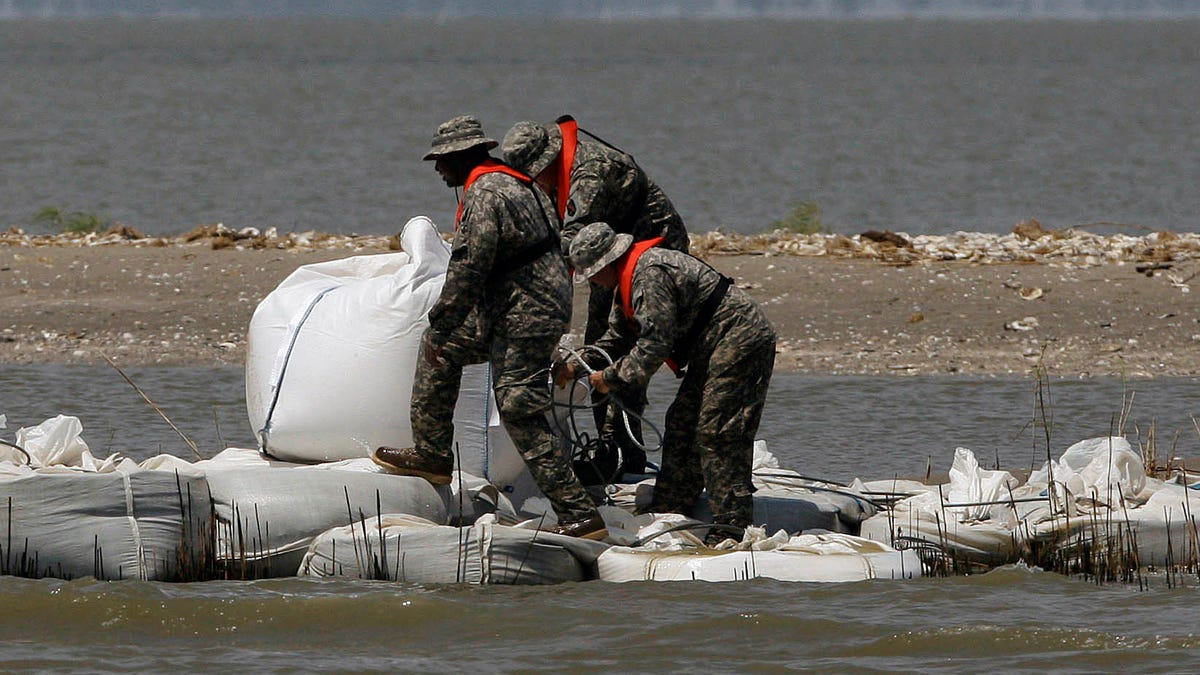
National Guardsmen walk along a barrier created by the National Guard from 2,000 pound bags of sand to block a pass in a effort to protect Scofield bay from oil from the Deepwater Horizon spill, Friday, June 11, 2010, near Venice, La.. (AP Photo/Eric Gay)
Defense Secretary Robert Gates has authorized up to 17,500 National Guard troops to fight the massive oil spill in the Gulf of Mexico, but only a fraction of that number has been deployed so far -- raising questions about where the troops are and why they have such a small presence.
A Defense official told Fox News that governors are afraid that activating more troops would be politically harmful, charging taxpayers a high cost for duties that won't keep troops busy. The skill sets these troops have don't match the needs, the official said, and the governors aren't about to pay soldiers to stand on the beaches waiting for oil to wash up.
Gates told "Fox News Sunday" that there isn't more the Pentagon could be doing to help stop the spill or to prevent millions of gallons of oil from washing up on the Gulf Coast.
"We have offered whatever capabilities we have," Gates said. "We don't have the kinds of equipment or particular expertise."
Gates said there is a standing offer for the authorization of up to 17,500 National Guard troops in Louisiana, Mississippi, Alabama and Florida, the four states that are most affected by the BP spill.
"If there's anything people think we can do, we absolutely will do it," he said.
Gates authorized the troops under Title 32 status, which means all costs would be reimbursed by the federal government, which in turn is charging BP.
Of the 6,000 troops it is authorized to deploy, Louisiana has activated about 1,100 for aviation support, sandbagging and hazmat training for those who might come in contact with the oil.
Alabama has activated 450 of the 3,000 troops authorized. Troops in that state are helping local business owners and others file claims against BP.
Mississippi has activated 50 of its 6,000 authorized troops, and Florida has activated 30 of its 2,500 to conduct aviation support.
Spokesmen for the four states' governors rejected the notion that politics is a factor in how many troops they activate.
"It's a question of is there a function for the National Guard to perform on the Gulf Coast," said Dan Turner, a spokesman for Mississippi Gov. Haley Barbour. "We're not going to send 6,000 National Guardsmen to stand on the beach just for show. But when there's a function for them, I don't think the governor would have any hesitation to call."
Turner said that with volunteers handling the bulk of the cleanup, including scooping up tar balls, there's nothing more the National Guard can do.
"But what we're seeing here is not the really sad and awful situation that you're seeing in south Louisiana," he said. "Thus far, we've been extremely fortunate that we have had as little contact as we have."
Kyle Plotkin, a spokesman for Louisiana Gov. Bobby Jindal, noted that the state mobilized 600 troops, then increased that number to 1,100 as the Coast Guard and BP approved more projects and missions. "As additional missions are approved, the National Guard determines if more Guardsmen are needed to conduct the projects," he said.
"Ultimately, we're less concerned with who completes the project and more concerned about actually completing the mission so we can keep this oil off our coast."
Sterling Ivey, a spokesman for Florida Gov. Charlie Crist, said the state will call up an additional 70 troops this week to pick up tar balls.
"We don't have the need for more troops right now because [the spill's] impact on Florida's shore is not as great in other states," he said. "If we see more oil washing ashore…we'll certainly bring them in. But right now, we don’t have the need for 2,500 troops walking up and down Florida's beaches."
Jennifer Ardis, a spokeswoman for Alabama Gov. Bob Riley, said the state will call up more troops if they are needed.
"We're just trying to be efficient with what we're doing," she said. "If we should need more, we will call more."




